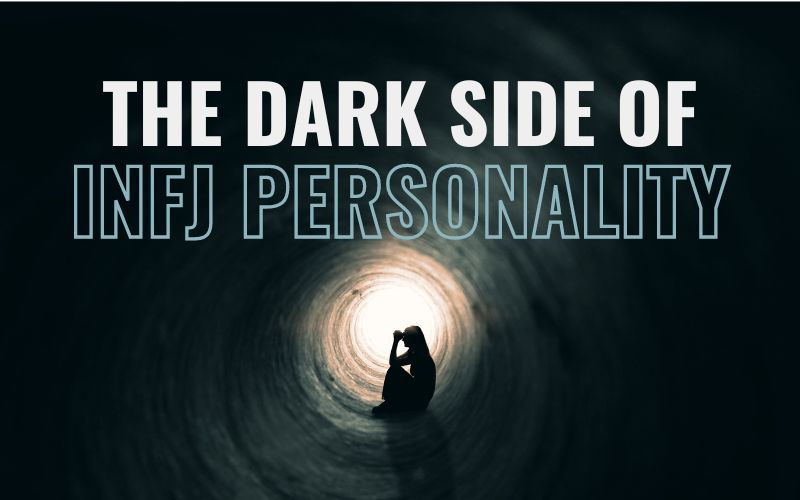Despite coming off as warm and approachable, the dark side of INFJs can be quite scary—I mean terrifying. These introverted individuals are typically laid back.
Some INFJs are even unaware of their dark sides as they are so good at controlling their emotions.
But you see, INFJs have a very intense and complex inner world. So, when they get pent up, people get surprised by how intimidating they can be.
And when they’re filled with frustrations or anger, you better watch out because their dark side will come out to play.
So, if you are curious to know the INFJ dark sides and their destructive tendencies, then what are we waiting for?
In this post, let’s talk about the Advocate’s dark sides.
Here we go:
8 Dark Sides of the INFJ Personality
1. INFJs Never Forget How You Wronged Them
INFJs are arguably one, if not the best, observers among the MBTI personality types.
They can easily remember their friends’ significant life events and milestones like their own. However, like a double-edged sword, their good memory also hurts them.
If you ever wronged them, you can expect two results: They will forgive and move on, or they do not forgive and move on. Either way, INFJs never forget how you hurt them, regardless if it happened years ago.
Say, if you ever made an unsolicited comment on an INFJ’s appearance that hurt their feelings, chances are they will remember how rude you were to them forever.
And if you cheat on an INFJ, don’t expect them to treat you the same way again. They will never forget the abuse, slights, and betrayal.
2. INFJs Expect Too Much of Others (And Feel Betrayed When Others Fall Short)

As empaths, they can relate to their friends’ emotions deeper than other personality types, making them the go-to person for rants. They not only listen but can go out of their way to help their friends.
However, INFJs have high expectations of themselves and others. As the bond and connection grow, an INFJ may start to demand the same efforts from their friends.
“I’m so loyal that I did this for you, so you should do this for me, too,” an INFJ might think.
Favors are fine, but what if an INFJ asks a request that you can’t seem to fulfill?
Say, they want a “little” tampering on a document, or maybe, a more difficult task like spying on their spouse.
See, unhealthy INFJs want their friends to willingly give up what they are doing, the same way they would sacrifice their time for them.
In this aspect, INFJs may fail to realize that not everyone has such commitment. Not everyone can reciprocate the same quality of emotional support that they give.
So what does this leave to INFJs?
Disappointment.
Bare minimum emotional support from friends upsets these emotionally sensitive individuals.
However, their feelings of betrayal and disappointment often come from unrealistically high expectations.
3. They Hold Grudges, Leading to Their Desire For Revenge
If you make an INFJ happy, expect them to be giddy and cheerful the whole day. However, if you mock or hurt them intentionally, expect them to be furious longer than any person you know.
What’s more, INFJs do not simply hold grudges. They let anger consume them to the point that they feel like they need to do something about it.
And guess what comes to their mind?
Revenge.
They would idealize perfect revenge and try to put justice onto their hands.
Mostly, their grudge is their defense mechanism when they do not want to show their vulnerability. INFJs would have sleepless and emotional nights processing their feelings.
But if you really have upset an INFJ, do not worry! These Advocates rarely act on their revenge, as they only imagine they would. They’re more prone to slam doors on people.
You may also like: INFJ Rage: 3 Ways INFJ Shows Anger
4. INFJs May Have Attachment Issues

Whether it is a new best friend or a significant other, INFJs love connecting with people.
But their craving for connections also has a downside especially when these introverted individuals may become too attached to the people they are often with.
Since they are still introverts, it takes INFJs a long time to find people whom they can trust. So if even one of those left, they get upset and unnecessarily clingy.
Because they have invested so much time, emotion, and effort in a person, they somehow lose their minds when that person’s gone.
This is why some INFJs are reluctant to leave a toxic relationship or even enter a relationship. They become too codependent and gradually destroy themselves when a person leaves due to their extreme attachment issues.
5. INFJs Can Mirror Negative Behaviors, Too
INFJs follow their intuition to guide them to good choices. But they can still disregard it if they want to be petty.
As these intuitives can feel other people’s emotions like their own, they can also tend to copy bad habits.
Mirroring behaviors often happen subconsciously, meaning they don’t notice it, well, until it’s too late. It starts with simply imagining themselves doing a behavior like smoking.
Eventually, as they see their friends smoke more frequently, INFJs don’t notice themselves buying a pack and joining the smoking club too.
This may be considered the most dangerous negative trait of an INFJ.
While there are amazing INFJs who uphold high morals, there are others that can lose their way, absorb bad habits and vices, and commit offenses — all in the name of friendship and relationships.

6. INFJs Are Excellent Manipulators
Without a doubt, INFJs share the ‘best manipulator’ award with INTJs.
INFJs know the ways of making their friends react by hinting at a trigger word.
Say, if they notice a friend getting excited when they talk about shopping, an INFJ could use topics related to shopping to fish out gossip from that person.
If you have an INFJ friend, chances are you have been manipulated at least once in the course of your friendship with them. These manipulative tactics range from simply doing a favor or treating them to dinner.
The possibilities are endless for an INFJ who knows how to play with people’s emotions.
Kind of scary, right?
You may also like: Can INFJs be Manipulative?
7. INFJs Will Cut Communication Without Saying A Word
Empaths get tired of socializing too, and the way INFJs recharge their social battery is by cutting off all their communication with everyone.
I have a friend who has opened up about how frustrating INFJs can be when they enter their isolating shells.
Other personality types would agree that these idealists commit a “selfish” act by randomly ending and pausing communications without any warning.
But in my INFJ friend’s defense, she simply needs a couple of days of complete silence. According to her, before going back to being everyone’s emotional support and therapist again, she needs her alone time.
8. They Are Unapologetically and Brutally Honest
The motto’ truth hurts’ is what INFJs live by.
Although they recognize how painful it could be to correct their friends’ flaws, they would rather do it than see their friends suffer. But INFJs also make their brutal honesty an excuse to be cruel to others.
INFJs would say truthful yet judgemental comments to people and get away with it by saying it was the truth. And although this dark side happens occasionally, they make sure it makes a mark on people when it happens.
Conclusion
INFJs are emotionally sensitive and caring friends. You can depend on them to be a shoulder to cry on nine times out of ten.
But on rare occasions when INFJs tap on their dark side, it will be ugly. These intuitive empaths can be cold, brutal, and manipulative at times. But they only do it when they lose grip of their emotions.
They have a deep desire to make the world a better place, and they’re always ready to help out when someone needs it.
That’s it. Do you have any more to add to the list? Share your insights below!
Thanks for reading. 🙂
You may also like:
- What Makes INFJ Smart?
- 7 Actionable Tips To Stop INFJ Procrastination
- INFJ Door Slam: What Does It Feel Like To INFJs and The Receiving End

